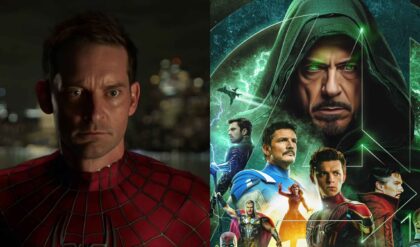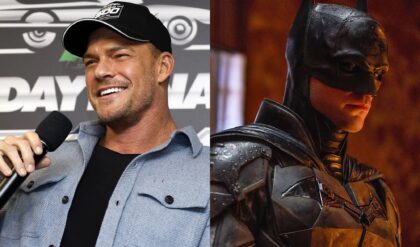In the neon-drenched shadows of a near-future Los Angeles, where the air crackles with the fury of water riots and the streets run red with the blood of the disenfranchised, there’s a sanctuary for the damned. Not a church, not a safehouse, but a crumbling Art Deco relic turned underground hospital, where the city’s most notorious outlaws check in for stitches and salvation—provided they follow the rules. No guns, no killing other guests, no cops, and absolutely no business deals on the premises. This is Hotel Artemis, the beating heart of Drew Pearce’s 2018 sci-fi crime thriller, a film that slunk into theaters like a thief in the night, earned a middling shrug from critics, and vanished into the streaming ether. But seven years later, in a cinematic landscape choked with endless franchises and algorithm-driven reboots, Hotel Artemis begs for resurrection. It’s a gritty, genre-bending gem packed with sharp wit, visceral action, and a powerhouse ensemble led by Jodie Foster in a role that redefines her legacy. Dismissed as a John Wick knockoff upon release, it was always more than that—a claustrophobic powder keg of moral ambiguity, corporate greed, and human frailty. If you missed it the first time, hit play now. This is the kind of movie that rewards a second look, revealing layers of cult-worthy brilliance beneath its B-movie sheen.
To grasp why Hotel Artemis feels like a shot in the arm for weary thriller fans, you need to dive into its fever-dream premise. Set on a single chaotic night in 2028, the film unfolds almost entirely within the titular hotel’s labyrinthine penthouse, a fortified warren of dimly lit corridors, antique medical bays, and rooms named after glamorous 1920s resorts—Honolulu, Acapulco, Nice—like ironic memorials to a lost era of elegance. Outside, Los Angeles is a tinderbox. A megacorporation has privatized the city’s water supply, sparking mass uprisings that pit desperate protesters against trigger-happy cops. It’s a prescient jab at inequality that hits harder today than it did in 2018, echoing real-world crises from Flint to global droughts. Into this maelstrom stumbles Waikiki (Sterling K. Brown), a seasoned bank robber reeling from a heist gone south. His younger brother, Honolulu (Brian Tyree Henry), lies bleeding out in the getaway van, a victim of his own itchy trigger finger. Desperate for discretion, Waikiki hauls him to the Artemis, flashing his membership chip like a VIP pass to hell.
The hotel isn’t just a hideout; it’s a members-only ER for the criminal elite, bankrolled by shadowy patrons and staffed by Jean Thomas, known only as The Nurse (Jodie Foster). She’s a relic herself—a disgraced surgeon in her seventies, her medical license revoked decades ago after a personal tragedy that still haunts her like a phantom limb. With the help of her hulking orderly, Everest (Dave Bautista), a gentle giant with a badge reading “Healthcare Professional” and a backstory as tragic as it is understated, The Nurse patches up the unpatchable. On this night, the roster swells to bursting: Nice (Sofia Boutella), a sleek French assassin with a vendetta and a penchant for 3D-printed bullets; Acapulco (Charlie Day), a jittery arms dealer peddling apocalypse in a vial; and, looming largest, the Wolf King (Jeff Goldblum), L.A.’s flamboyant crime lord and the Artemis’s secret financier, arriving with a gut wound and his spoiled heir, Crosby (Zachary Quinto), in tow. Oh, and there’s a wildcard: a battered riot cop (Jenny Slate) who breaches the no-cops rule, stirring up ghosts from The Nurse’s past.
Pearce, making his directorial debut after penning blockbusters like Iron Man 3 and Mission: Impossible – Rogue Nation, stuffs the frame with kinetic energy, drawing from Hong Kong action flicks and grindhouse classics like Death Race 2000. The first half crackles with setup—tense check-ins, whispered alliances, and a ticking clock as the riots encroach like a tidal wave. Pearce’s world-building is a masterclass in efficiency: holographic vitals flicker over gurneys, robotic arms suture wounds with mechanical precision, and the hotel’s creaky elevator doubles as a Faraday cage to jam surveillance. It’s Blade Runner meets The Grand Budapest Hotel, but grittier, with a noir undercurrent that probes the blurred lines between healer and enabler. The Nurse’s ironclad rules aren’t just plot devices; they’re a fragile code of honor in a world where survival means breaking every other one. As guests collide—Waikiki’s brotherly loyalty clashing with Nice’s cold professionalism, Acapulco’s sleaze grating against the Wolf King’s aristocratic menace—the film builds to a symphony of betrayals and brawls, all confined to this pressure-cooker space.
But what elevates Hotel Artemis from pulpy diversion to something stickier is its unflinching humanity. Amid the gunfire and gadgetry, Pearce weaves threads of redemption and regret. Waikiki, the film’s moral anchor, grapples with enabling his brother’s self-destructive spiral, their bond a raw counterpoint to the hotel’s transactional vibe. The Nurse, meanwhile, drowns her agoraphobia in cheap whiskey, her panic attacks visualized as hallucinatory flashbacks to a life unlived. It’s here that the film’s social bite sharpens: the water riots aren’t backdrop; they’re the villain, a faceless corporate hydra that starves the masses while the elite hoard bottled Mulwray (a sly nod to Chinatown‘s water baron). In one standout sequence, as flames lick the horizon, The Nurse stares out a barred window, murmuring, “This city’s always been a desert pretending to be a paradise.” It’s a line that lingers, turning the thriller into a lament for America’s fraying social contract.
No discussion of Hotel Artemis is complete without Jodie Foster’s seismic return to acting after a five-year hiatus spent directing (Money Monster, The Beaver). At 55 during filming, Foster doesn’t just play The Nurse—she inhabits her, transforming into a septuagenarian specter of resilience and ruin. It’s a gritty, unglamorous pivot from her polished Oscar turns in The Silence of the Lambs or The Accused, one she fought for fiercely. “I wanted the rawness of the years,” she later reflected, pushing for prosthetics that etched deep furrows into her face, a shuffling gait that spoke of decades bent over operating tables, and a Brooklyn-inflected rasp honed from chain-smoking her way through rehearsals. The makeup—gray streaks in her hair, liver spots on her hands—ages her two decades, but it’s the performance beneath that astonishes. Foster channels Barbara Stanwyck’s snap and Bette Davis’s bite, delivering quips like “I’ve seen worse, but not by much” with a world-weary smirk that masks seismic sorrow. Her Nurse is tough as corroded steel, barking orders at Everest while fumbling for her flask, but cracks appear in quiet moments: a trembling hand during a suture, a choked sob over a patient’s file. It’s a portrait of grief weaponized into grit, the story of a woman who lost her son to the streets she now stitches up, turning her prison of a hotel into a perverse maternity ward for society’s abortions.
Foster’s alchemy turns The Nurse into the film’s soul. In a ensemble this stacked, she could have been overshadowed, but she anchors the chaos with a vulnerability that’s equal parts maternal and monstrous. Her chemistry with Bautista simmers with unspoken history—two orphans running a foundling home for felons—while her confrontations with Goldblum pulse with electric familiarity, their shared past a minefield of affection and exploitation. Boutella’s Nice slinks through like a panther in stilettos, her action-hero poise begging for a spinoff, and Brown’s Waikiki brings quiet intensity, his every glance heavy with the weight of fraternal failure. Goldblum, in a cameo that’s pure velvet villainy, drawls threats like jazz riffs, while Day’s manic Acapulco provides comic relief that’s equal parts annoying and endearing. Even Quinto’s petulant Crosby and Slate’s haunted cop add texture, their arcs colliding in a finale that explodes the hotel’s fragile equilibrium. The supporting cast isn’t just star power; it’s a pressure test for Pearce’s script, proving that even in a pressure-cooker setting, character trumps spectacle.
Upon its June 2018 release, Hotel Artemis faced a perfect storm of bad timing and misplaced expectations. Dropped into a summer dominated by Jurassic World: Fallen Kingdom and Incredibles 2, it grossed a paltry $3.1 million domestically against a $10 million budget, vanishing faster than a guest dodging bill collectors. Critics were split: Roger Ebert praised its “dark humor and bits of social commentary,” calling it a throwback to ’70s exploitation flicks, while The Guardian lauded its “craftily constructed dystopian thriller” vibe. But detractors piled on, from CNN’s dismissal as a “peculiar mishmash” to Variety’s gripe over “frustratingly half-baked” ideas. The John Wick comparisons stung hardest—fair, given the safe-haven-for-killers trope, but reductive. Wick is ballet in blood; Artemis is a bar fight in a blackout. Box office autopsy? It was a mid-budget original in a franchise era, marketed as high-octane action when its heart lay in moody introspection. Audiences stayed away, perhaps wary of Foster’s “aging up” or the single-location setup screaming “stage play gone sci-fi.”
Yet, in the years since, Hotel Artemis has simmered into cult territory, the kind of film that thrives on rewatch forums and late-night streams. Reddit threads buzz with converts: “Underrated gem—Foster’s Nurse is Oscar-worthy,” one user raves, while another calls it “better the second time, like peeling an onion of cool details.” Letterboxd logs average 3.2 stars, with fans hailing its “effervescent tone” and “darkly nuanced themes.” Streaming revivals on platforms like Max have sparked fresh waves, especially post-2020, as viewers crave escapist worlds that mirror our own unrest. Pearce’s restraint—no CGI overload, just practical effects and tight choreography—feels revolutionary now, a antidote to Marvel’s bombast. And that ending? A mid-credits tease of survival and resurgence screams sequel bait, with the Artemis’s neon sign flickering back to life amid the ashes. In a 2023 interview, Pearce mused about expanding the universe—sister hotels in Tokyo or Berlin—proving the film’s bones are sturdy enough for more.
What Hotel Artemis nails, and why it demands your second (or first) chance, is its unapologetic weirdness. It’s not flawless—the second half rushes its resolutions, and some backstories feel sketched rather than sculpted—but its flaws are the charm of a director finding his voice. Pearce blends Pulp Fiction dialogue with Escape from New York grit, scoring it to a Cliff Martinez pulse that hums like a migraine. The production design—faded murals of tropical idylls peeling over bloodstained tiles—is a character unto itself, evoking L.A.’s faded glamour. And Foster? Her transformation isn’t just physical; it’s a defiant middle finger to Hollywood’s youth obsession. “I fought for the tragedy of it,” she said, embracing the crickety body and bottled despair. In an industry that sidelines women over 50, she commandeers the screen, proving age is just another scar to flaunt.
Today, as dystopias feel less like fiction and more like forecasts—corporate overlords squeezing the last drops from the tap—Hotel Artemis resonates deeper. It’s a thriller that whispers about the cost of complicity, the fragility of sanctuary, and the quiet heroism of those who mend the broken anyway. For fans of The Menu or Bad Times at the El Royale, it’s a spiritual sibling: ensemble-driven, idea-rich, and unafraid to get messy. Stream it, savor the slow burn, and let Foster’s Nurse usher you into the fray. In a year of sequels begging for your bucks, this hidden crime saga asks for nothing but your time—and repays it with chills, laughs, and a lingering ache. Hotel Artemis isn’t just deserving of a second chance; it’s the fresh start we all need.





